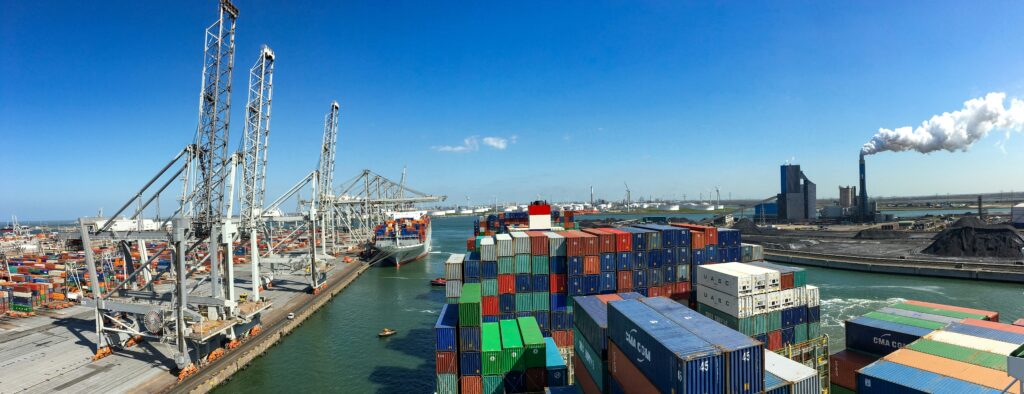
Discover how AI is revolutionizing supply chain optimization by improving efficiency, enhancing decision-making, and reducing costs. Learn how AI-driven predictive analytics, machine learning, and automation are transforming logistics operations for businesses worldwide.
The Role of AI in Supply Chain Optimization
Supply chain management, especially for global businesses, has always been a complex challenge.
With numerous moving parts, including inventory control, supplier management, transportation logistics, and demand forecasting, optimizing these elements is crucial for cost reduction and improved operational efficiency.
Fortunately, AI is emerging as a powerful tool that can revolutionize how businesses manage their supply chains, streamlining operations and boosting overall productivity.
AI in Inventory Management: A Game-Changer
AI’s ability to analyze and predict market trends has drastically transformed inventory management. Traditional inventory control methods often result in overstocking or understocking, causing delays and increased costs.
AI systems can now predict demand more accurately by analyzing historical data, customer behavior, and even external factors like weather and market conditions.
For instance, Amazon has successfully integrated AI to manage its vast inventory, ensuring products are available when needed while reducing waste.
Moreover, AI can continuously monitor supply levels and alert managers when stock levels are too low or when there is an excess. This not only reduces the risks of running out of stock but also ensures efficient resource use by minimizing storage costs.
Enhancing Decision-Making with Predictive Analytics
A key advantage of AI in supply chain management is its ability to provide real-time insights through predictive analytics. Machine learning algorithms, trained on large datasets, can identify potential supply chain disruptions before they happen.
By considering factors such as supplier performance, geopolitical risks, and market trends, AI systems allow supply chain managers to make more informed decisions. As a result, companies can react quickly to prevent delays and manage risks more efficiently.
Predictive analytics is particularly useful in transportation and logistics. AI-powered tools can analyze traffic data, fuel prices, and weather patterns to recommend the most efficient delivery routes, reducing delivery times and fuel costs.
Companies like UPS and FedEx are already leveraging AI to optimize their transportation networks.
Cost Reduction Through AI Automation
AI automation is another game-changer in supply chain management. By automating routine tasks such as order processing, shipment tracking, and supplier communications, businesses can significantly reduce operational costs.
AI tools can automatically reorder supplies when inventory levels fall below a certain threshold, reducing human error and freeing up staff for more strategic tasks.
Additionally, AI can optimize supply chain processes by identifying inefficiencies and recommending improvements. For example, AI-powered analytics might suggest changes in supplier contracts or shipping methods that could lead to cost savings.
These AI systems can run simulations to determine the financial impact of potential changes, allowing managers to make data-driven decisions confidently.
Improving Supplier Relationships with AI
AI systems also enhance supplier relationship management. By analyzing supplier performance data, businesses can identify trends and assess the reliability of their suppliers.
If a supplier consistently delivers late or provides substandard products, AI can flag these issues early, giving managers time to find alternative solutions. Furthermore, AI can assist in contract negotiations by analyzing market trends and suggesting favorable terms.
Future of AI in Supply Chain Optimization
AI’s potential in supply chain management is enormous. As machine learning models continue to evolve, we can expect even greater levels of optimization in areas such as demand forecasting, real-time tracking, and dynamic pricing.
As businesses become more adept at leveraging AI, supply chains will become more agile, resilient, and cost-effective.AI offers transformative potential for optimizing supply chains.
From improving inventory management to reducing operational costs, AI-driven tools are helping businesses stay competitive in a rapidly changing global market. The future of supply chain management is undoubtedly AI-powered.
Check out our next article on How to Set Up AI for Supply Chain Optimization at 4/09/13/how-to-set-up-ai-for-supply-chain-optimization/
Also, here is the link to IBM’s AI in Supply Chain solutions https://www.ibm.com/supply-chain which offers in-depth insights on how AI is used to optimize supply chain management, enhance logistics, and improve operational efficiency


